Related Articles
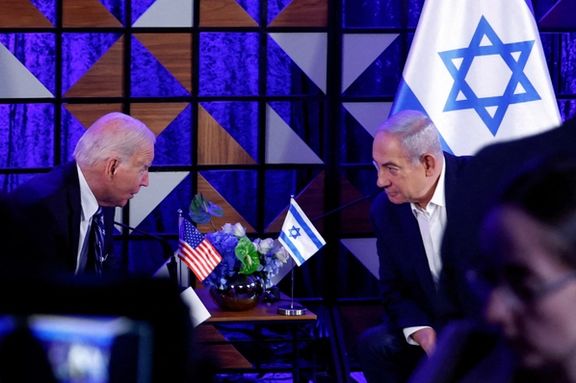
In an interview with Iran International, an Israeli security chief criticized the Biden administration for putting Israel at risk after years of taking a soft approach on Iran.
“Never once did the Americans threaten an attack on Iran - not once - they only talked about ‘defending’,” he said, speaking on condition of anonymity. He argued that the lack of a firm stance has emboldened Tehran, increasing security threats to the region and compromising Israel's safety.
“The US uses soft terminology, and it has zero deterrent effect,” he added, meaning that the proxies Iran has across Israel’s borders remain as big a threat as ever.
Since Iran-backed Hamas’s invasion on October 7, 2023, Israel has been bombarded almost daily with rocket, missile and drone attacks on its northern border from Iran’s biggest proxy, terror-listed group Hezbollah. Other projectiles have been fired at Israel from Iran’s proxies in Iraq, Yemen and Syria.
While the US is urging a ceasefire, that to Israel, would mean surrendering to Hamas, “it places us at huge risk across the country by sending a message to terrorists that they have won” he explained.
“They are treating Hamas like they have always treated Iran, with kid gloves,” the security chief said. “We have Hezbollah in the north, multiple terror groups including Hamas in the West Bank, the Houthis sitting on the Red Sea in the south as well as Hamas, and Syria. That’s not to mention Iraq,” he added.
As the US presidential elections approach, the Biden administration is desperate to go out with a bang, sealing a ceasefire deal to win over the Democratic electorate as the death toll in Gaza mounts and 101 Israeli hostages remain in the strip.
“The Gaza war has been totally manipulated around the elections and the Iranians can see that,” he added. “It plays right into their hands. But more importantly, Bibi [Israeli Prime Minister, Benjamin Netanyahu] also sees that and he won’t be pressured for the sake of someone’s political gains in the US.”
On Monday, the US State Department spokesman, Vedant Patel, spoke of “getting a ceasefire deal across the finish line” which critics see as meaning sealing a deal for Biden before he leaves office.
Patel acknowledged the risks of tensions spreading, citing the need for security “not just in the immediate Gaza Strip and the surrounding areas but the region broadly, and the benefits that it [a ceasefire] could have when it comes to peace and stability and calm and the reduction of tensions in the West Bank as well.”
Currently, 60,000 Israelis have been displaced from Israel’s north amid the conflict with Hezbollah and as many or more Lebanese have been displaced in Lebanon.
“One of the reasons we continue to be so committed to a ceasefire and getting one across the finish line is because of the benefits that it could have in the north for creating the conditions so that both Israeli and Lebanese civilians could be able to return home,” Patel said.
President Joe Biden has been slammed at home and abroad for his weak stance on Iran which since his taking office, has seen Iran enrich uranium close to weapons grade levels, increase illicit oil sales, and implement high level diplomatic hostage diplomacy, despite global sanctions.
Last year alone, five US citizens held unlawfully in Iran were released in exchange for $6bn worth of frozen Iranian funds.
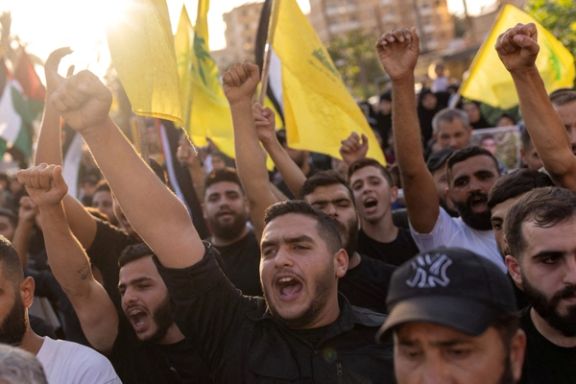
Iran, through its proxies, has encircled Israel in a multi-front war that is slowly expanding as more violent and new fronts emerge. A former IDF spokesperson is now calling on the Israeli government to take the fight directly to the root cause: Iran.
Former IDF combat commander in Lebanon and Gaza, Lt.- Col (ret) Jonathan Conricus, told Iran International in an interview that Israel needs to hold the Islamic Republic responsible.
"Israel has an interest and should be taking the war to Iran. I think the Israeli strategy should be very clear that the Islamic Republic of Iran is responsible for directly funding and arming terrorist organizations that are killing Israelis," said Conricus.
The next time that one of Iran-backed proxies strike Israel, Conricus would like to see Israel retaliate directly against the Islamic Republic. That would include options like Iran's facilities, military, strategic infrastructure, and the government.
“All of the targets are kosher and, on the table, and they will be attacked by Israel because Iran has been aggressive against Israel for so long."
He made it clear that Iranian people are not Israel's enemy and that civilians should not be targeted.
For years, Israel's strategy has been one to retaliate against Iranian proxies without directly involving Iran. Israel is believed to have disrupted Iran’s nuclear ambitions by going after various facilities and scientists. It likely has strong intelligence on Tehran’s nuclear weapons program, which has increased its total stockpile of highly enriched nuclear fuel and is reportedly close to becoming a nuclear power.
In an interview with Iran International, the former IDF spokesperson said Israel's current strategy of dealing with Iran's proxies while trying to undermine its nuclear ambitions is not working, but Iran's plan has proven to work.
"I'm sad to admit it," said Conricus, "But the Iranian strategy of encircling Israel with terrorist organizations and fighting a war of attrition is working for Iran, and they are not paying the price for their aggression."
Conricus, who is a senior fellow at the Foundation for Defense of Democracies (FDD), would like Israel to change the equation and formulate a comprehensive national strategy that has economic, political, and military components, which would undermine Iran's ruling system. He wants Israel to take a leadership role in that fight.
"The people are not our enemy, but the Islamic Republic regime, the Revolutionary Guard, the Basij, the secret police and the evil, oppressive regime of Iran..weaken them. And when an opportunity comes also to help brave Iranians fight against the regime.”
Iran planting the seeds for a new front?
Israeli's Foreign Minister Israel Katz posted to X on Monday "The Iranian terror octopus is working to establish an eastern terror front against Israel and moderate states in the region. We must cut off the octopus's tentacles."
Katz was referring to the escalation in the West Bank, also known Judea and Samaria in Israel, where violence has increased, and recent videos posted to social media show armed militants with ISIS and Hamas flags.
Shaiel Ben-Ephraim, a journalist and analyst who covers Israeli news and politics, posted to X on Monday a photo that was reportedly taken in Jenin where terrorist organizations allegedly run the refugee camps.
He posted that the image was from a funeral in the city. He wrote that "Sources in the army said, "We will find those in these pictures and get to them eventually." But more operations are just a band-aid. The answer is to bring governance back to Jenin, Tulkarem, and other cities where the PA has lost its grip. Otherwise, the rest of the cities of the West Bank will all look like this eventually.
Conricus, who served in the IDF for 24 years, said there’s been a slow and steady escalation of terrorism in the region. Jihadi sentiments existed before the Israel-Hamas conflict, but the key difference now is the increased availability of weapons. These weapons, allegedly originating from Iran, are funneled through Iraq and Syria and smuggled via Jordan, a US ally.
The former IDF spokesperson said the Palestinian Authority can't control it, and that in the last three weeks, five Palestinian suicide bombers were dispatched, with two of them detonating prematurely, while the other cases were thwarted.
“The Palestinian Authority, if you listen to their communications in Arabic and in English, they speak about the Iranians. They say that they're seeing Iranian influence in Judea and Samaria,” said Conricus.
Three Israeli civilians were killed in a shooting at the Allenby Crossing on the border between the West Bank and Jordan, Israeli authorities said Sunday.
The gunman, from Jordan, carried out the attack in a commercial cargo area under Israeli control where Jordanian trucks offload cargo entering the West Bank, officials said.
The IDF is also investigating after a young Turkish American woman, Aysenur Eygi, was shot and killed in the West Bank on Friday, according to US and Palestinian officials, while she was taking part in a protest near Nablus.
Behnam Ben Taleblu, a senior fellow at the Foundation for Defense of Democracies (FDD), said the West Bank and Jordan have the “Iranian target on their backs."
Iran is reportedly working to destabilize the Kingdom and capitalize on the sympathies many in the West Bank have towards civilians in Gaza, and to arm them to create more fronts in the "ring of fire" against Israel.
It’s all part of Tehran strategy of a slow “death by a thousand cuts” approach towards Isarel according to Taleblu.
Israeli PM: the situation in the north must change
Over to the north, the likelihood of an all-out war between Israel and Hezbollah has intensified, with Israeli Prime Minister Benjamin Netanyahu instructing the Israeli military on Sunday to prepare to “change the situation in the North.”
National Unity party leader Benny Gantz, who left Netanyahu’s government in June, warned that the conflict may be imminent, saying it is already unfolding “too late.”
US Central Command chief Michael Kurilla arrived in Israel on Sunday for meetings with senior Israeli security officials in a visit focused on threats from Hezbollah and Iran.
Since October 7, Hezbollah has launched daily attacks against Northern Israel – employing rockets, anti-tank missiles, and explosive UAVs at both military and civilian targets.
Hezbollah has reportedly as many as 150,000 missiles and rockets pointed at Israel.
Seventy thousand Northern Israelis, living within a 5-kilometer radius of the Lebanon border, evacuated after October 7 and remain displaced within their own country. While Hezbollah initially targeted these "ghost town" areas, the Iran-backed group is now increasingly focusing on non-evacuated zones, escalating the conflict in more populated regions.
Israel Channel 12, citing Israeli security sources, said that the war with Hezbollah is “approaching."
Taleblu, who specializes in Iranian security, told Iran International it’s too early to tell whether Lebanon will get dragged into a larger scale war with Israel.
“Israel is facing something of a multi-front war brought to you by the Islamic Republic. But ultimately, based on how the response to the escalation goes, if the Islamic Republic doubles down, if it brings in more weapons transfers, more technology, or if it tries to respond again, it certainly does have the potential to spiral,” he said.
For many Northerners, they're already facing a war, but Hezbollah's strategy, said Conricus is to “keep this situation of instability, where Israel is split between dealing with Hamas in Gaza and Hezbollah in Lebanon.”
The number of rockets has increased and so too has the range. And it’s all about a balancing act.
“They [Hezbollah] have to escalate incrementally, but they must be careful not to escalate too much,” said Conricus, who emphasized that too much escalation would trigger an Israeli response that would not be to Hezbollah's benefit.
Another front: Syria
Israel launched strikes on military sites in Syria on Sunday, reportedly killing at least 25 people, injuring dozens, according to Syrian state media.
The ariel strikes took place in Western Syria at 4 different locations, which are believed to be bases for Iranian forces and militia, housing what’s known as the Scientific Studies and Research Center (CERS), allegedly producing weapons.
Israel claims the CERS manufactures precise surface-to-surface missiles. Israel’s Alma, an institute focused on threats to northern Israel, has revealed in a detailed report that the CERS manufactures chemical, biological, and potentially nuclear weapons”.
Conricus said it’s believed there may have been an attempt by Iran to deliver the weapons to Hezbollah, but that Israel intercepted those weapons before they could be sent.
The Islamic Republic responded by blaming Israel, with the country's foreign ministry spokesperson Nasser Kanani saying at a news conference in Tehran Monday "we strongly condemn this criminal attack by the Zionist regime on Syrian soil."
Since the Israel-Hamas war broke out, Israel regularly targets military sites in Syria linked to Iran, but the intensity of Sunday's strike and death toll was significant.
The former IDF commander said those facilities have been struck in the past and he sees only one path forward as a solution:
“We can defeat Hamas and then defeat Hezbollah but if we don't deal with the root cause of instability and terrorism in the Middle East. We won't solve our problems long term. It's high time for Israel to change its strategy against the Islamic Republic of Iran."
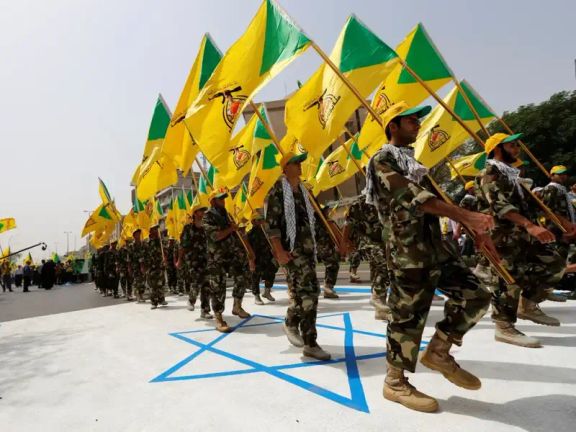
The Iraqi militia group Kata’ib Hezbollah, backed by Iran's IRGC Quds Force, has been linked to recent terrorist plots targeting Jewish centers in Uzbekistan and Kazakhstan, as Tehran seeks to expand its influence beyond the Middle East.
Kata’ib Hezbollah, also known as Hezbollah Brigades, is an Iraqi Shia militia formed in 2007. Aligned closely with Iran, the group is a part of the Popular Mobilization Forces (PMF) in Iraq. The US-designated group's activities are heavily backed by Iran through training, weapons, and financial support.
Beyond Iraq, Kata’ib Hezbollah has extended its operations to Syria, where it fights alongside other Iranian-backed militias in support of the Bashar Al-Assad regime, and now to Central Asia.
Sources have confirmed to Iran International that Kataib Hezbollah has been carrying out terrorist activities in Uzbekistan and Kazakhstan through a Tajik operative identified Muhammad Ali Burhanov, also known as Sayed Hamid al-Tajiki.
The Iraqi militant group's operation in Central Asia was first reported by Terror Alarm on X earlier this month.
Burhanov, who has been linked to multiple attacks in Central Asia, reportedly studied at Al-Mustafa University in Iran—a known recruitment hub for Tehran-backed militant groups. This university, operating under the Islamic Propaganda Bureau of the Qom Seminary, has branches in nearly 60 countries and serves as Iran's primary instrument for spreading Shi'ism internationally.
Al-Mustafa University had earlier drawn scrutiny, particularly in 2020 when it was allocated a budget of nearly 5 trillion rials, or approximately $100 million at the time, making it the most heavily funded university in Iran. The United States sanctioned the university in December 2020 for recruiting Afghan and Pakistani students to fight in Syria, with Canada following suit in October 2022 for its role in recruiting foreign fighters.
The involvement of Burhanov and his operatives in Central Asia is reportedly supported by the IRGC Quds Force’s Department 400, with direct involvement from senior officials such as Hossein Rahmani and Hossein Rahban. These figures are instrumental in recruiting young militiamen and collaborating with various extremist groups, including Jihadists, ISIS, and the Taliban.
Recent operations linked to Burhanov for Kata’ib Hezbollah have included a failed gunfire attack on the Jewish Agency offices in Almaty, an attempted arson at the Ohr Avner Jewish Center in Almaty, and arson attacks on a farm owned by Saxovat Broyler Co. in Tashkent and a warehouse owned by Neostream Co. in Almaty.
Iran has a long history of hostility towards Jews, often manifesting through both direct and indirect actions. Since the 1979 Islamic Revolution, the Iranian government has embraced an openly anti-Israel stance, which has frequently spilled over into broader anti-Semitic rhetoric and actions.
The government has supported and funded various proxy groups, such as Hezbollah and Hamas, which have carried out attacks against Jewish targets, both in the Middle East and globally. Iran's involvement in bombings, such as the 1994 attack on the AMIA Jewish community center in Buenos Aires, which killed 85 people, highlights its longstanding agenda of targeting Jewish communities far beyond its borders. The Islamic Republic's anti-Semitic propaganda, denial of the Holocaust, and calls for the destruction of Israel further fuel this deep-seated enmity, creating an environment where anti-Jewish violence is not only tolerated but encouraged.
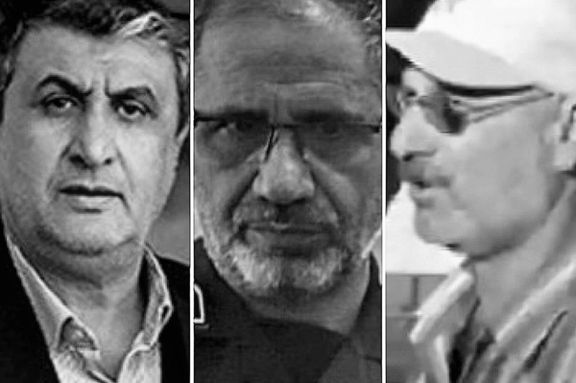
Iran is intensifying efforts on its secretive nuclear weapons program, bringing the country closer than ever to developing a nuclear bomb—a threat that has loomed for over two decades, according to exclusive information obtained by Iran International.
According to three independent sources in Iran, who have chosen to remain anonymous due to the sensitive nature of the topic, the Islamic Republic is advancing its secret nuclear weapons program by restructuring the Organization of Defensive Innovation and Research (SPND), retaining Mohammad Eslami as the head of the Atomic Energy Organization of Iran, and resuming tests to produce nuclear bomb detonators.
For years, US intelligence agencies consistently stated in their annual reports that Iran “isn’t currently undertaking the key nuclear weapons development activities necessary to produce a testable nuclear device". However, in the Director of National Intelligence’s 2024 report, released in July, that phrase was omitted. Instead, the report stated that Iran has “undertaken activities that better position it to produce a nuclear device, if it chooses to do so.”
The newly obtained information shows the Islamic Republic has intensified its efforts to complete the nuclear weapons production cycle, including high-level uranium enrichment, the production of nuclear detonation devices, and the development of missiles capable of carrying nuclear warheads.
Restructuring SPND.
Less than a month before Ebrahim Raisi's death, the Iranian Parliament passed a bill to formalize the Organization of Defensive Innovation and Research (SPND) as an independent entity. Originally established in 2010 as a subsidiary of the Ministry of Defense, SPND was restructured under this new legislation, enacted just a week before Raisi's passing.
Mohsen Fakhrizadeh, a prominent figure in Iran's military nuclear program, previously led SPND.
Fakhrizadeh was assassinated in November 2020 near Tehran, an act attributed to Mossad. The new law has granted SPND financial independence, exempting it from the oversight of the National Audit Office, essentially allowing it to operate without accountability for its budget.
The law also states that SPND will be governed according to a statute issued by Supreme Leader Ali Khamenei. This restructuring of SPND is significant as it provides the organization with unique autonomy, allowing it to continue the legacy of Fakhrizadeh's work, particularly in producing nuclear detonation devices
SPND’s role in Iran’s nuclear program
On January 20, the Islamic Republic used a solid-fuel, three-stage satellite carrier named Qaem-100, developed by the Islamic Revolutionary Guard Corps (IRGC), to launch a satellite called Sorayya into orbit. The move drew condemnation from Germany, Britain, and France, who issued a joint statement claiming that the Qaem-100 missile uses long-range ballistic missile technology.
Since the US withdrawal from the Joint Comprehensive Plan of Action (JCPOA), Iran has increased its uranium enrichment purity levels to 60% and has accumulated enough enriched uranium to potentially produce several nuclear bombs in a short period of time. The capability to build a nuclear weapon involves a complex cycle with three essential components: highly enriched uranium, the construction of a detonator, and the development of a delivery system capable of carrying a nuclear warhead.
Sources indicate that Tehran’s efforts to launch IRGC satellites are part of its plan to develop missiles capable of carrying nuclear warheads. SPND, on the other hand, continues to work on the production of another crucial component of Iran's nuclear program: the development of nuclear detonators. This project reportedly continued covertly under the guise of "Project 110" after the 2003 exposure of "Project Amad."
Documents reveal that after 2003, Tehran continued to work on neutron initiators for nuclear warheads at the Abadeh site, where previous detonator tests had been conducted. According to sources, SPND began a project named "Metfaz" at the Abadeh facility in 2011, involving one of the three key figures of Iran's current military nuclear program. The Islamic Republic had previously claimed that this program was halted.
A photo from 2018 shows that Tehran was testing the explosive detonators needed for nuclear warheads during the two years leading up to that date, a time when the JCPOA was still in effect.
Saeed Borji’s role
Saeed Borji, an explosives and metals expert from Malek Ashtar University, affiliated with the Ministry of Defense, has been instrumental in Tehran's nuclear weapons program. For a time, he operated under the guise of a company named Azar Afrouz Saeed Engineering Company, which claimed to manufacture spherical tanks for the petrochemical industry.
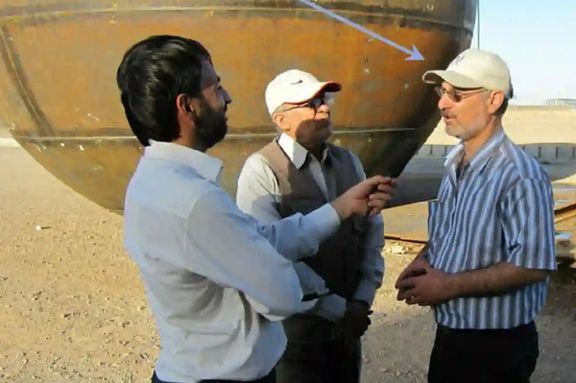
When Mossad stole Iran's nuclear documents in 2018, Tehran realized that the Abadeh site had been exposed and immediately demolished it, as satellite images confirm. According to exclusive information obtained by Iran International, Saeed Borji has recently resumed his activities under the cover of a company named Arvin Kimia Abzar, claiming to be involved in the petrochemical industry.
In September 2022, Borji transferred part of his shares in this company to the Center for the Growth of Advanced Defense Technology Units, affiliated with SPND. His partner, Akbar Motallebizadeh, who previously served as an advisor to Mohsen Fakhrizadeh and the head of SPND’s "Shahid Karimi" group, has also played a significant role in these activities.
Both Saeed Borji and Motallebizadeh, who are currently under US sanctions, are overseeing the development of nuclear detonators under the supervision of General Reza Mozaffarinia. Mozaffarinia, the former president of Malek Ashtar University and former deputy for industrial research at the Ministry of Defense, has been the successor to Mohsen Fakhrizadeh at SPND for the past three years. He has been a part of Iran's nuclear weapons program for many years.
An informed source within the Ministry of Defense told Iran International that the formation of the independent SPND organization with its own budget and without oversight is a crucial part of the Islamic Republic's nuclear weapons program.
Why did Pezeshkian keep Eslami in charge?
The program has another key player. Earlier this week, Masoud Pezeshkian, Iran’s new president, retained Mohammad Eslami as the head of the Atomic Energy Organization of Iran. Eslami is a pivotal figure in Iran's nuclear weapons program who is very different from previous heads of the Atomic Energy Organization.
Between 1987 and 1989, Eslami managed a sensitive mission as the deputy head of development projects at the Defense Industries Organization. He led a team sent by the Islamic Republic to Dubai for a secret meeting with Abdul Qadeer Khan, the Pakistani nuclear scientist who later admitted to transferring nuclear technology and enrichment equipment to Iran.
In one of the nuclear documents stolen from Iran, Eslami’s role is prominently featured. As the head of the Defense Industries Training and Research Institute, he had overseen all aspects of Iran’s military nuclear program, including Project Amad, which was supervised by Fakhrizadeh.
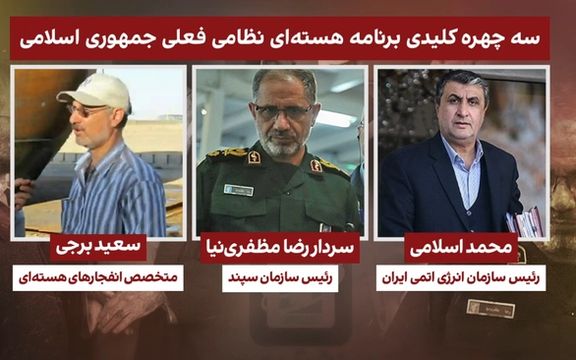
Eslami continued to serve as the deputy for industrial and research affairs at the Ministry of Defense for two years after the JCPOA was signed. According to sources within the 4 / 4Ministry of Defense and SPND, Eslami's retention was ordered by Khamenei to maintain the cohesion of the new three-member team leading Iran's military nuclear program.
Shifting to nuclear weapons for deterrence
A Western diplomat told Iran International that Iran's suspicious nuclear activities have raised concerns among the United States, Israel, and European countries. Following the assassination of Hamas leader Ismail Haniyeh, the head of Hamas' political bureau in Tehran said the Islamic Republic's deterrence policy, which relied heavily on proxy forces, has lost its effectiveness, something Khamenei and other government officials are fully aware of.
This reality might have driven the Islamic Republic to consider pursuing another form of deterrence. On the day Pezeshkian presented his ministerial picks to the Parliament, Iranian lawmaker Mohammad-Reza Sabbaghian told the open session, "What logic or law dictates that arrogant powers should have nuclear weapons, but Iran should not?"
He added, "We call on the Supreme National Security Council to review the new circumstances and recommend to the Supreme Leader that, considering dynamic Islamic jurisprudence, the path be cleared for the development of nuclear weapons."
This could be the final, and perhaps most dangerous, arrow in Khamenei's quiver.
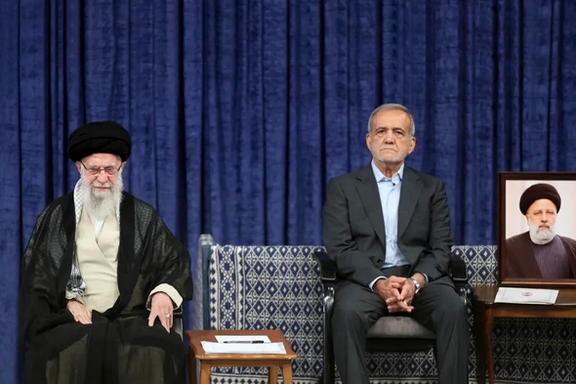
Iran’s newly elected president, Masoud Pezeshkian, has pleaded with Supreme Leader Ali Khamenei to refrain from attacking Israel, warning of its devastating impact on his presidency, according to sources familiar with the matter, who spoke on condition of anonymity.
Iran has been threatening to launch a direct missile attack against Israel to avenge the July 31 assassination of Hamas chief Ismail Haniyeh in Tehran, despite calls for restraint by its friends and foes. However, this desire for vengeance is apparently not shared by all high-ranking officials in Tehran, as there are voices expressing concern about the potential repercussions.
In a recent meeting with Khamenei, President Pezeshkian urged the 85-year-old ruler Khamenei to prevent any direct Iranian attack on Israel to avoid escalating tensions into an unwanted war, the informed sources told Iran International. This potential conflict, Pezeshkian warned, could severely disrupt his presidency and lead to significant problems.
Pezeshkian cautioned that a decision by Israel to launch harsh retaliatory attack against Iran's national infrastructure and energy resources could cripple the Iranian economy and potentially lead to the country's collapse.
Despite the grave warnings, sources said, Khamenei remained noncommittal during the session, neither supporting nor opposing Pezeshkian’s concerns.
Pezeshkian further warned about the rhetoric and actions of senior military commanders that could drag the country into war, noting that he faces relentless pressure from factions within the Islamic Revolutionary Guard Corps (IRGC) who demand a strong military response against Israel, regardless of the significant social and economic costs involved, said the sources who requested anonymity due to the sensitivity of the case.
The president asserted that his opposition to military action is rooted in national interest and not due to a lack of knowledge or experience in security and military matters, as claimed by hardliners. He stressed that initiating a war with Israel would make economic recovery and bridging the already deep divide between the Islamic Republic and its citizens impossible, severely damaging Iran's international standing, which the country desperately needs to improve.
IRGC Chief-Commander Hossein Salami on Monday said Israel will learn a lesson once it receives Iran's "severe response". Iranian authorities also told Arab countries that the country no longer cares whether its attack on Israel will trigger an all-out war in the Middle East, a report by The Wall Street Journal said.
Last week, a close aide to Pezeshkian told The Telegraph that the security lapse that resulted in Ismail Haniyeh's killing in Iran "may have been an intentional bid by the IRGC to harm the new president’s reputation. “No unharmed brain can accept that this happened by accident, especially on Pezeshkian’s first day in office,” he said. “He may have to go to war with Israel in his first few days in office and it’s all because of the IRGC.”
The president’s private plea for restraint contrasts with his public statements affirming Iran’s right to respond to Israel’s killing of Haniyeh, though he has largely avoided using inflammatory language and even told world leaders Tehran does not seek escalation.
In comments on Wednesday, Pezeshkian made it clear that he would not question the policies dictated by the Supreme Leader in public and in his meetings with foreign officials. “At the inauguration and swearing-in ceremonies, I was told to speak about the country's problems, but the fourteenth government does not permit itself to criticize Iran in front of other nations."
Pezeshkian said in a Monday meeting with top Russian security official Sergei Shoigu that "Iran is by no means seeking to expand the scope of the crisis in the region, but this regime will certainly receive a response for its crimes and arrogance." Shoigu was visiting Tehran to convey Vladimir Putin’s message of de-escalation to Iranian authorities.
The Iranian president also told his French counterpart Emmanuel Macron on Wednesday that “Iran reserves the right to give an appropriate response” to Israel’s killing of Ismail Haniyeh, without repeating the harshly worded statements of the Islamic Republic’s Supreme Leader and military authorities.
In his recent meeting with Khamenei, the newly elected president emphasized the importance of “citizens' trust in their elected representatives”, highlighting the low voter turnout in the recent presidential election as an indicator of deep-seated distrust, the sources told Iran International.
Iran’s 2024 presidential election -- held almost a year early, after President Ebrahim Raisi died in a helicopter crash in May – witnessed the lowest-ever voter turnout rate in the history of the Islamic Republic.
More than 16 million voted for Pezeshkian, according to official figures, many in the hope of preventing hardliners from heading all three branches of government, even though Pezeshkian himself announced he will be implementing the policies dictated by Ali Khamenei.
